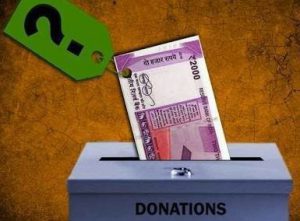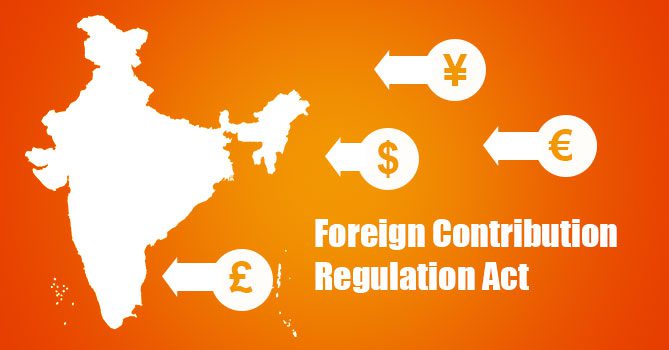The amended Foreign Contribution Regulation Act (FRCA) contains the seeds that can sow the beginnings of a take-over by any foreign power sooner than later but also smacks of a betrayal of the trust imposed by the people of this country in their political parties. But then betrayal is hardly a new thing in the subcontinent’s governance. We’ve had our Mir Jaffars and the Purnayyas and with Easter, this Sunday, we are reminded of the ultimate betrayal of mankind for a few pieces of silver, reminds Sreelata, in the expose, exclusively for Different Truths.
In 1615, Emperor Jahangir gave the British East India Company trading rights in India. They built their first factory in Surat and the rest is history. Soon, India ceased to be an India by the Indians, for the Indians, and of the Indians.
 Similarly, embedded innocuously in the 2018 Finance Bill, which was passed without debate or discussion on the 13th of March is an amendment that can have equally long-term terrifying consequences for our nation. The amended Foreign Contribution Regulation Act (FRCA) is one among 218 amendments and two Bills that were passed almost stealthily amid din by Parliament without comment.
Similarly, embedded innocuously in the 2018 Finance Bill, which was passed without debate or discussion on the 13th of March is an amendment that can have equally long-term terrifying consequences for our nation. The amended Foreign Contribution Regulation Act (FRCA) is one among 218 amendments and two Bills that were passed almost stealthily amid din by Parliament without comment.
It not only contains the seeds that can sow the beginnings of a take-over by any foreign power sooner than later but also smacks of a betrayal of the trust imposed by the people of this country in their political parties. But then betrayal is hardly a new thing in the subcontinent’s governance. We’ve had our Mir Jaffars and the Purnayyas and with Easter, this Sunday, we are reminded of the ultimate betrayal of mankind for a few pieces of silver, so why then should we be surprised.
What is more alarming is the complete silence of mainstream media including the electronic channels that usually not only become hysterical but also go hammer and tong – with multiple multi-panel discussions- on almost anything and everything, however, trivial. To date, TV channels have had no compunction in declaring people anti-national or anti this or anti that while the government itself has hauled up many an unsuspecting citizen for apparently being so. Strangely, other than some news items and a few statements announcing the passing – without any debate – of the amendments there has been no alarm – manufactured or otherwise – no stir on something as anti-national as this.
Nobody in the Government or the Opposition has been asked to explain how without any explanation, a 1976 Act is being amended again and again. The few newspapers who have carried the news tell us that it has been done to suit one or the other of our main political parties.
The Representation of the People Act and the FCRA (1976) lays down the rules for elections and disallows foreign funding of political parties. Any company Indian or foreign registered abroad or with subsidiaries abroad was deemed a foreign firm – that is till now.
This 1976 Act was replaced by the 2010 FCRA with minor changes but continued to lay emphasis on keeping foreign funding from having any influence over our political parties. Foreign funds received were open to scrutiny.
In 2014, a plea was filed in the Delhi Court accusing the BJP and the Congress of taking donations in 2010 from a subsidiary of the UK based Vedanta, a foreign company. The Court found both parties guilty of having violated the FCRA and asked the Election Commission and the Government to initiate action against them
from a subsidiary of the UK based Vedanta, a foreign company. The Court found both parties guilty of having violated the FCRA and asked the Election Commission and the Government to initiate action against them
So, in 2016, the FCRA was amended again ostensibly to protect both the BJP as well as the Congress.
The Government now changed the very definition of foreign companies. It stated that any company with less than 50 percent share capital held by a foreign entity would no longer be foreign anymore and it came into retrospective effect from 2010. It was also deemed to be an Indian company if its ownership in an Indian entity was within the foreign investment limits set by the Government for that sector. It was the Government’s view that the original stipulation was inconsistent with the periodic changes that have been made subsequently.
Strangely, all this even as activists like Teesta Setlvad’s assets were being frozen and action being taken against foreign-funded NGOs like Greenpeace and others for FCRA violations. Between 2011 and 2017 more than 15,000 NGOs had their licenses under scrutiny for receiving funds from abroad with many being cancelled or not renewed. The Government apparently believed that these funds were being misused to cause widespread disturbances in the country. For transparency, they are now required to open accounts in 32 Government designated banks.
Both the Congress and the BJP since 1976 are guilty of having received foreign funding in more than two dozen instances from the Indian subsidiaries of companies like foreign-based Vedanta, Dow Chemicals, and others, especially between 2004 and 2010. Since the 2016 amendment only addressed the issue  retrospectively from 2010 they were still liable for prosecution.
retrospectively from 2010 they were still liable for prosecution.
So to perhaps circumvent this, the urgent necessity to bring in the current March 2018 amendment especially as the Association for Democratic Reforms (ADR) – in 2017 had again initiated another petition – Contempt of Court, since neither the Government nor the EC was seen to be taking any action against the two parties.
Now, with the current 2018 amendments in place both the parties are home scot free. Not only is foreign funding now free from scrutiny, any violation since 1976 – 42 years retrospectively – can no longer be considered a violation either.
However, the ADR questions the very basis of the new amendments as they dwell on what they say is a defunct Act of 1976 that has already been replaced by the 2010 Act similar in nature.
In between, the Government also removed the cap on corporate funding that said only 7.50% of a company’s profits could be allowed as a donation. Anonymous funding was also being allowed. The companies did not have to specify or name the political party they were funding either. This was being done apparently to allow accounted money to flow into the coffers of political parties as against unaccounted.
All these amendments do appear to negate the primary purpose which was to prevent political parties and thereby the Government from being influenced by money power. Also, with this new love of the Indian diaspora abroad for wanting a say in domestic politics and the ruling party’s jubilant preoccupation with them the floodgates are now wide open.
The Indian diaspora is among the largest in the world. We have currently 16.6 million of our people living abroad. So even if only a small percentage with the right credentials were to dabble in political funding, it could sit far away, easily swing political thinking any which way. But that is not the real danger. Now, any company with malafide intentions from anywhere even with 51% Indian shares and headquartered in India with an apparent showing of 49 % percent foreign shares could if it so chooses to fund Indian political parties – in other words, control Indian politics. Why would any entity fund anything unless it hopes to gain something? This appears to have in other words helped to legalise external influence peddling and corruption.
abroad. So even if only a small percentage with the right credentials were to dabble in political funding, it could sit far away, easily swing political thinking any which way. But that is not the real danger. Now, any company with malafide intentions from anywhere even with 51% Indian shares and headquartered in India with an apparent showing of 49 % percent foreign shares could if it so chooses to fund Indian political parties – in other words, control Indian politics. Why would any entity fund anything unless it hopes to gain something? This appears to have in other words helped to legalise external influence peddling and corruption.
However, farfetched it may seem at the moment if ISIS floats a company with 51 percent Indian shares and decides to enter Indian politics we have no way of knowing or stopping them unless other safeguards are in place. If China decides to insidiously swing the markets or even take over our political scenario to assist maybe Pakistan we will be defenseless. It also makes what Pakistan is currently doing through its conduits in Kashmir legal. Why very soon we might even have our own Syria in the making with foreign-funded political parties at each other’s throats.
It would have been prudent in the interests of the nation if these two parties had quietly paid up their penalties and not tampered with an Act that was meant to protect us. It would appear that the two parties who are constantly at aggressive loggerheads have come together to shortchange their citizens for short-term gains or is someone else already calling the shots?
Only time will tell.
©Sreelata Menon
Photos from the Internet
#PoliticalPartyFunding #ForeignContributionRegulationAct #Vedanta #DowChemicals #DelhiCourt #CoverStory #DifferentTruths





 By
By

 By
By